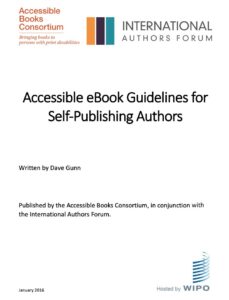Digital publishing has created such an explosion of options for indie authors in getting their books out into a worldwide marketplace, yet our books often sadly remain inaccessible to millions of readers.
Both print and ebook publications are not reaching the eyes, ears, and hands of so many people who would love to experience the immense pleasure and importance reading brings into our lives due to having a ‘print disability’.
Self-Publishing Accessible Ebooks: A New Guide
A brand new professional tool offering a comprehensive guide to empower authors in understanding the first steps towards making their manuscript accessible for millions has arrived. This comprehensive publication written by Dave Gunn, Accessible eBook Guidelines for Self-Publishing Authors is published by the WIPO Accessible Books Consortium, in conjunction with the International Authors Forum (IAF), and is being made available to you by the Alliance of Independent Authors.
This is a tremendous resource that every indie author who is keen to create accessible eBooks should peruse.
This set of guidelines the first of its kind. It also provides a highly practical overview of the world of accessible publishing, complete with a helpful checklist, and a “further resources” list.
All this strengthens an author’s sense of confidence in creating their next manuscript in an accessible publication format, and reading through the set of guidelines opens one’s eyes to key terms while raising one’s awareness to current software options when considering the design of an accessible eBook.
One of the highlights of reading through the guidelines as a vision-impaired author is knowing that I can also take advantage of a set of guidelines accessible to both author and reader.
Why Publish Accessible Ebooks?
As a visually-impaired person and indie author myself, I am not fond of placing people into categories but it is worth pointing out that this group includes those living with a physical or sensory disability (such as being blind or vision-impaired), as well as those having a cognitive and learning disability – with Dyslexia affecting a staggering one in ten people globally. Therefore, it is highly probable that potential readers are not accessing our books and it doesn’t have to be this way. Katie Webb[/caption]
In a few easy steps you can open up your books to the millions of readers who can’t access texts in conventional formats because they are visually impaired or otherwise ‘print disabled’.
I am so grateful to our industry ‘watchdogs’ such as the International Authors Forum (IAF), the Accessible Books Consortium (ABC) and the Alliance of Independent Authors (ALLi) who are dedicated to creating a global network empowering authors with a set of standards that will make more books accessible to more people.
If the seeking of knowledge and the freedom to read books is important to you, I encourage all writers and publishers to seriously consider how creating ebooks in accessible formats is the next frontier to publishing: by taking up the recommendations set out in these guidelines, we open the way forward to create more possibilities for a worldwide readership.
Be a proud link in the chain which enables people like myself to stay connected through our passion for our craft.
Together, we can support each other and bring the focus on reaching a whole new audience by designing our manuscripts in an accessible format available for everyone to enjoy.
Accessible eBook Guidelines for Self-Publishing Authors – Download Here
Self-Publishing Accessible Ebooks: A Guide for Indie Authors
Share
Comments are closed.
Latest advice, news, ratings, tools and trends.
Inspirational Indie Author Interview: Mike Carden Turns Humorous Cycling Trips into a Writing Career in Midlife
My ALLi author guest this episode is Mike Carden. He’s an author from England who came to writing in midlife. He has independently published six books. Many of them are humorous cycling travelogues. They mix history, conversation, and self-deprecating humor. Readers connect with his warmth and honesty.
News Summary: Publishers Defend Bid to Join Google AI Lawsuit; AI-Generated Romance Novels Spark Debate
A roundup of AI news to end the week brings a story that has already whipped up a storm and a story that might well do so. But first, a development in the Gemini legal case I reported on recently. You will recall that publishers have sought to join authors in a copyright case against Google's Gemini.
News Podcast: Bookshop.org Expands Into E-Books, Audio, and Print with Major New Partnerships
On this episode of the Self-Publishing with ALLi podcast, Dan Holloway focuses on a wave of developments around Bookshop.org, including its new partnership with Draft2Digital that makes it far easier for indie authors to sell e-books through the platform. He also looks at expanded audiobook options via Libro.fm’s new annual subscription model and a major new partnership with Spotify that connects audiobooks, physical books, and indie bookstores through seamless format switching.








[…] Reaching all our Readers: Making books that Everyone can read: Katie Webb & Maribel Steel […]
[…] Reaching all our Readers: Making books that Everyone can read: Katie Webb & Maribel Steel […]
[…] Reaching all our Readers: Making books that Everyone can read: Katie Webb & Maribel Steel […]